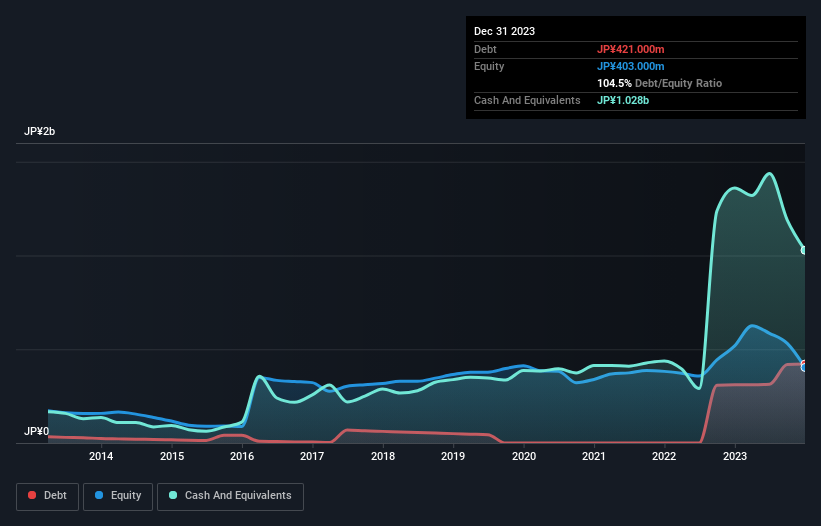The external fund manager backed by Berkshire Hathaway's Charlie Munger, Li Lu, makes no bones about it when he says 'The biggest investment risk is not the volatility of prices, but whether you will suffer a permanent loss of capital.' So it seems the smart money knows that debt - which is usually involved in bankruptcies - is a very important factor, when you assess how risky a company is. We can see that J Escom Holdings,Inc. (TSE:3779) does use debt in its business. But the more important question is: how much risk is that debt creating?
Why Does Debt Bring Risk?
Generally speaking, debt only becomes a real problem when a company can't easily pay it off, either by raising capital or with its own cash flow. Part and parcel of capitalism is the process of 'creative destruction' where failed businesses are mercilessly liquidated by their bankers. However, a more common (but still painful) scenario is that it has to raise new equity capital at a low price, thus permanently diluting shareholders. By replacing dilution, though, debt can be an extremely good tool for businesses that need capital to invest in growth at high rates of return. The first step when considering a company's debt levels is to consider its cash and debt together.
View our latest analysis for J Escom HoldingsInc
What Is J Escom HoldingsInc's Net Debt?
The image below, which you can click on for greater detail, shows that at December 2023 J Escom HoldingsInc had debt of JP¥421.0m, up from JP¥311.0m in one year. However, its balance sheet shows it holds JP¥1.03b in cash, so it actually has JP¥607.0m net cash.

A Look At J Escom HoldingsInc's Liabilities
According to the last reported balance sheet, J Escom HoldingsInc had liabilities of JP¥1.90b due within 12 months, and liabilities of JP¥63.0m due beyond 12 months. Offsetting this, it had JP¥1.03b in cash and JP¥734.0m in receivables that were due within 12 months. So its liabilities total JP¥201.0m more than the combination of its cash and short-term receivables.
Since publicly traded J Escom HoldingsInc shares are worth a total of JP¥1.85b, it seems unlikely that this level of liabilities would be a major threat. But there are sufficient liabilities that we would certainly recommend shareholders continue to monitor the balance sheet, going forward. While it does have liabilities worth noting, J Escom HoldingsInc also has more cash than debt, so we're pretty confident it can manage its debt safely. When analysing debt levels, the balance sheet is the obvious place to start. But it is J Escom HoldingsInc's earnings that will influence how the balance sheet holds up in the future. So if you're keen to discover more about its earnings, it might be worth checking out this graph of its long term earnings trend.
In the last year J Escom HoldingsInc wasn't profitable at an EBIT level, but managed to grow its revenue by 48%, to JP¥1.8b. Shareholders probably have their fingers crossed that it can grow its way to profits.
So How Risky Is J Escom HoldingsInc?
Statistically speaking companies that lose money are riskier than those that make money. And the fact is that over the last twelve months J Escom HoldingsInc lost money at the earnings before interest and tax (EBIT) line. And over the same period it saw negative free cash outflow of JP¥305m and booked a JP¥239m accounting loss. Given it only has net cash of JP¥607.0m, the company may need to raise more capital if it doesn't reach break-even soon. With very solid revenue growth in the last year, J Escom HoldingsInc may be on a path to profitability. By investing before those profits, shareholders take on more risk in the hope of bigger rewards. There's no doubt that we learn most about debt from the balance sheet. But ultimately, every company can contain risks that exist outside of the balance sheet. Case in point: We've spotted 3 warning signs for J Escom HoldingsInc you should be aware of, and 2 of them can't be ignored.
Of course, if you're the type of investor who prefers buying stocks without the burden of debt, then don't hesitate to discover our exclusive list of net cash growth stocks, today.
New: Manage All Your Stock Portfolios in One Place
We've created the ultimate portfolio companion for stock investors, and it's free.
• Connect an unlimited number of Portfolios and see your total in one currency
• Be alerted to new Warning Signs or Risks via email or mobile
• Track the Fair Value of your stocks
Have feedback on this article? Concerned about the content? Get in touch with us directly. Alternatively, email editorial-team (at) simplywallst.com.
This article by Simply Wall St is general in nature. We provide commentary based on historical data and analyst forecasts only using an unbiased methodology and our articles are not intended to be financial advice. It does not constitute a recommendation to buy or sell any stock, and does not take account of your objectives, or your financial situation. We aim to bring you long-term focused analysis driven by fundamental data. Note that our analysis may not factor in the latest price-sensitive company announcements or qualitative material. Simply Wall St has no position in any stocks mentioned.
About TSE:3779
J Escom HoldingsInc
Through its subsidiaries, engages in the sale of hairdressing and beauty consumables to hairdressers and esthetic salons in Japan and South Korea.
Acceptable track record with mediocre balance sheet.
Market Insights
Community Narratives


